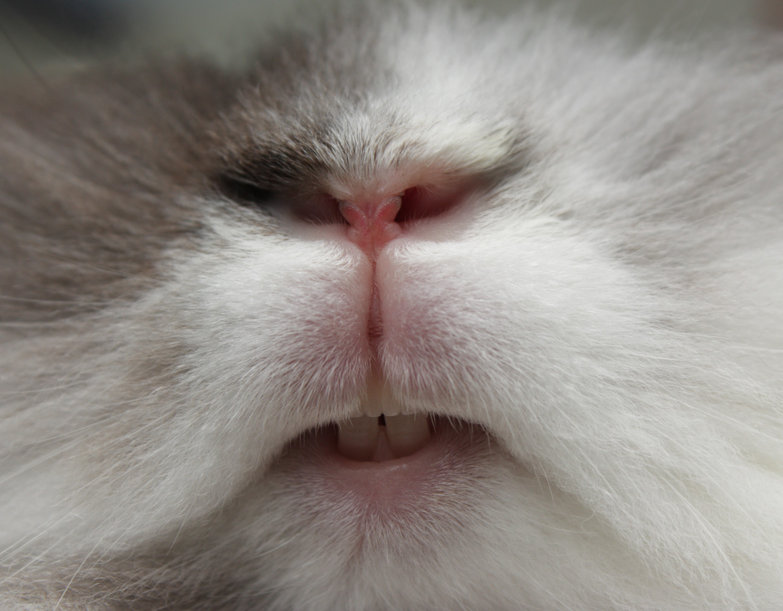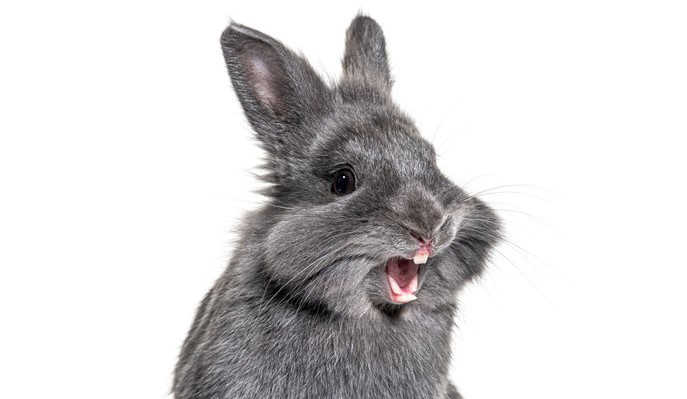dental problems
Did you know that rabbits' teeth continue to grow throughout their lives? The rabbit is designed for that and luckily they grow just fast enough that the rabbit can keep them at the right length by eating and gnawing.
But sometimes a rabbit does not manage to wear its teeth properly, then problems arise with the rabbit's teeth
How do rabbit's teeth work?
A rabbit's teeth consist of two lower incisors, two upper incisors, two pin teeth (behind the upper teeth) and 22 molars (11 on each side). Rabbits do not have canines, so there is a bit of nothing between the incisors and molars. Normally the incisors grow 1,5 to 3 millimeters per week and the molars about 2-6 millimeters per month.
With healthy rabbit teeth, the teeth and molars are well together and wear out by making chewing movements. If the teeth and molars are not straight together, the rabbit cannot wear them down properly while eating. The parts that do not wear well continue to grow and this creates a crooked position of the teeth or hooks on the molars. Because they continue to grow, the teeth will sting the palate or tongue and that is not a nice feeling for the rabbits.
How can you recognize dental problems?
Rabbits with teething problems should be checked out by a veterinarian. Therefore ring the bell in time if your bunny has one or more of these symptoms:
– Eating poorly or avoiding certain (hard) foods
– Difficulty eating leafy vegetables or other large pieces of food (rabbit continues to chew but the leaves do not shrink)
– Enthusiastically approaching the food but then “change your mind” or stop eating after a few bites
- Lose weight
– Drooling
– Wet nose and or dirty, watery eyes
– Discolored teeth
– Protruding teeth or teeth that do not sit nicely on top of or next to each other
– Bump on the jaw edge
– Protruding eye on 1 side
– poorly cared for coat
– Drops that are noticeably smaller than before
How can you treat dental problems?
If the teeth, despite the right food and gnawing material, do not wear out well and grow too fast, it is important to take them to the vet in time. They often put the bunny under anesthesia to get a good look at all the molars. If they see that the teeth do indeed grow too far, they will sharpen the teeth. This is done by a grinding wheel or a dental drill. In this way almost no force needs to be put on the teeth.
In some cases, it is then decided to remove the incisors. Since otherwise they have to be shortened again and again. The rabbits can still eat without incisors.
What can you do to prevent dental problems?
Of course prevention is better than cure! Proper nutrition is half the battle. Give your rabbit lots of hay. Hay is chewy and high in fiber. In order to grind hay, the rabbit's molars have to work hard, this ensures the right wear. In addition, feeding a good, hard kibble is also very important. The front teeth are used to make the chunks small enough so that the molars can grind them.
In addition to good nutrition, it is important that you gnawing material offer so that the bunny has plenty of opportunities to use and wear its teeth. The Corky Chunks from Back Zoo Nature are very suitable for this.
Sometimes the right diet and sufficient gnawing material is not enough. The teeth can also not wear well because they do not sit well in the jaw. This can be hereditary, but also due to a fall or other trauma to the head.



